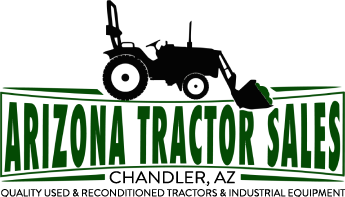Excavator Operation Tips: Maximize Efficiency and Safety with Arizona Tractor Sales
Excavator Operation Tips: Maximize Efficiency and Safety with Arizona Tractor Sales
When it comes to construction, demolition, or digging, excavators are among the most versatile and essential pieces of equipment on any worksite. These powerful machines help you complete tasks efficiently and safely, but like all heavy equipment, they require proper operation and maintenance to perform at their best.
At Arizona Tractor Sales, we pride ourselves on offering a wide selection of used excavators that are thoroughly inspected and ready for work. Serving the Chandler area and the Western United States, we’re committed to not just selling quality equipment but ensuring that our customers know how to operate it safely and effectively.
To help you get the most out of your excavator, here are some expert tips on excavator operation—whether you’re a first-time operator or a seasoned pro.
1. Understand Your Excavator’s Controls and Settings
Before you start operating an excavator, it’s crucial to get familiar with its controls. Modern excavators come with a variety of levers, pedals, and joysticks that manage everything from arm movements to bucket actions. Each manufacturer and model might have different layouts, so it’s important to read the operator's manual and practice operating the equipment before taking it into the field.
Make sure to adjust the seat and control settings to your comfort level. A well-adjusted seat and control setup will not only make you more comfortable but also help you stay focused and minimize the risk of fatigue, which is critical for both safety and performance.
2. Check the Equipment Before Each Use
Performing a pre-operational inspection before starting any project can save you time and prevent costly repairs down the line. Walk around the excavator and check for any visible signs of wear and tear, such as leaks, loose parts, or cracks. Make sure that all hydraulic hoses are in good condition and that the undercarriage is free from debris. Also, check the fuel levels, engine oil, and coolant to ensure everything is properly maintained.
By catching any small issues early, you’ll avoid breakdowns and ensure the excavator is in top working condition.
3. Master Proper Excavator Positioning
Positioning your excavator correctly is key to maximizing productivity and safety. Always position the machine on stable, level ground, especially when operating on slopes. This will reduce the risk of rollover accidents. When working on slopes or uneven terrain, make sure the undercarriage is properly balanced to avoid unnecessary strain on the machine.
It’s also important to adjust your positioning based on the task at hand. For example, when digging, the bucket should be angled to minimize strain on the arm and hydraulics. For lifting or loading, position the excavator as close as possible to the load to maximize lifting capacity.
4. Operate with Precision
Excavators are designed to handle delicate tasks with precision—whether it’s digging a trench or moving materials. Slow and steady movements are key to ensuring you have full control over the machine. Quick, jerky movements can cause unnecessary wear and increase the risk of accidents.
When using the bucket to dig or move dirt, aim for smooth, consistent motions. Take time to understand the excavator's range of motion and how it responds to different inputs. You should also use the arm and bucket together to maximize efficiency. Digging and lifting in a controlled manner will save both time and fuel.
5. Stay Aware of Your Surroundings
Safety should always be a top priority when operating any heavy machinery. Situational awareness is critical to avoid accidents and injuries. Always make sure your worksite is clear of obstacles or other workers before starting, and maintain a safe distance from the edge of trenches or excavations to prevent cave-ins.
It’s important to also communicate with your team. Having clear signals or using two-way radios ensures that everyone is on the same page, particularly when working in busy or tight spaces. Additionally, make sure to wear the appropriate PPE (personal protective equipment) like helmets, gloves, and ear protection.
6. Know When to Stop and Check the Machine
During long hours of operation, it’s easy to forget to periodically check the equipment. Taking breaks not only allows the machine to cool down but also gives you a chance to monitor performance and spot any potential issues early. Stop the excavator regularly to inspect the engine and hydraulics to ensure everything is running smoothly. You can also check your digging progress to ensure you're meeting project goals and specifications.
7. Proper Excavator Maintenance
Regular maintenance is essential to prolonging the life of your excavator and ensuring it runs efficiently. After each use, clean the undercarriage, remove any debris, and check for signs of wear on the tracks and bucket. You should also follow the manufacturer's maintenance schedule for hydraulic fluid, oil, and filter changes. At Arizona Tractor Sales, we’re proud to offer used excavators that are ready to perform, and we’re always happy to assist with any maintenance questions.
Why Choose Arizona Tractor Sales?
If you’re looking to purchase a reliable used excavator or need expert advice on operation and maintenance, Arizona Tractor Sales is your trusted partner. We provide a wide selection of used excavators and other heavy equipment designed for efficiency and durability. Whether you’re working on a small project or a large-scale operation, our excavators are up to the task.
We proudly serve the Western United States and offer a variety of financing options, as well as a layaway program, making it easier to get the equipment you need at a price that fits your budget.
To explore our selection of used excavators, visit us online at www.arizonatractorsales.com or give us a call at 602-377-2850. Our team is ready to help you find the perfect equipment to keep your operations running smoothly.

